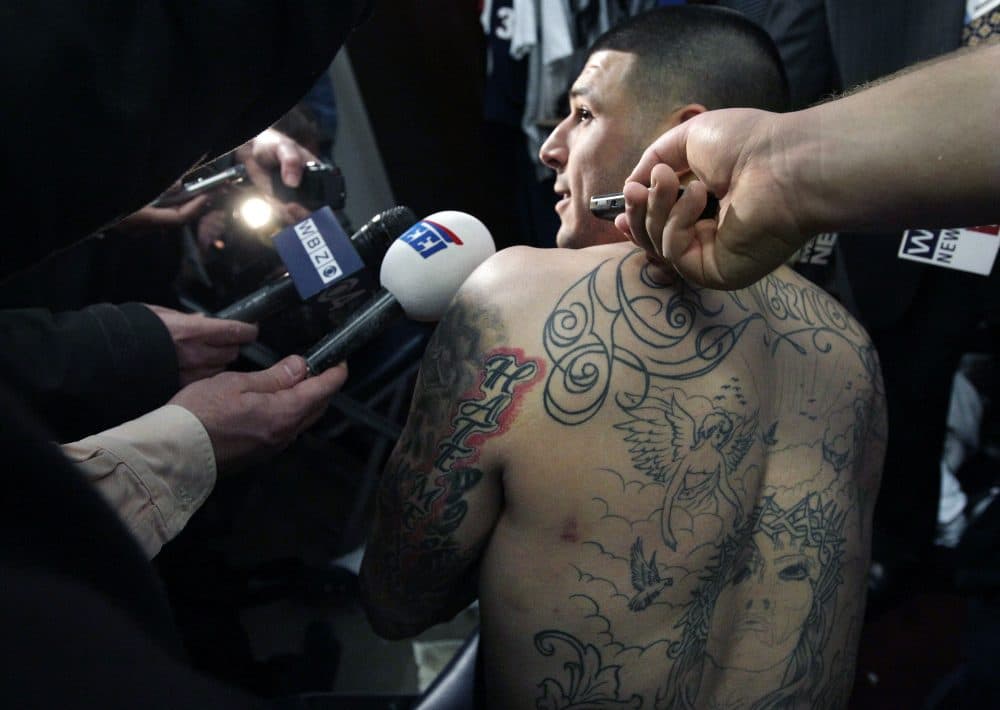Advertisement
Commentary
With Aaron Hernandez's Death, A Reminder To Heed 'Red Flags'

People will make of the story of Aaron Hernandez what they will.
That’s not to say there are not plenty of facts from which to draw conclusions. For example, there is a murder conviction. The verdict happened, no matter what happens next.
Long before the 2015 murder conviction, there were other illegal adventures people claimed had ties to Hernandez. He allegedly punched a bouncer in a bar, seriously injuring him. Apparently, that could be forgotten and forgiven as he was helping his college football team to a championship. The other accusation involved shooting guys.
In the immediate aftermath of Aaron Hernandez’s death, his agent and others have maintained that he couldn’t possibly have killed himself, presumably because he provided them with no indication that he was going to do that.
When the coaches and general managers are presented with so-called “red flags,” they weigh the potential risk in hiring the players above whom those flags are waving against the potential rewards.
In the context of that assertion, it’s perhaps worth recalling that Aaron Hernandez had been misleading people with regard to his intentions for some time. As Ron Borges wrote in a 2013 profile of Hernandez for Rolling Stone, “Robert Kraft described himself as ‘duped’ by Hernandez.” Borges, as familiar with how pro football works as any sportswriter is likely to be, characterized that assertion as “arrant nonsense.” It probably is. Pro football teams are big businesses. They employ professionals to investigate the players whom they may draft. When the coaches and general managers are presented with so-called “red flags,” they weigh the potential risk in hiring the players above whom those flags are waving against the potential rewards.
Consider these hypotheticals: If the player is just another lineman, good but not necessarily great, who needs a lineman who’s been stopped four times for driving under the influence? If the player is a back who’d rather run over people than around them and has done so in one of the more competitive conferences for a couple of years, hey, how important could that reckless endangerment charge really be? And maybe that young lady was exaggerating when she told the campus police officer the young man threatened her life.
A jury ruled that Hernandez had committed murder. When he died, he left behind a record of self-destructive behavior. There’s no arguing that some of the circumstances of his youth weren’t atrocious. His mother was arrested for bookmaking. His father, with whom he was reportedly very close, died when Hernandez was 16. But those who characterize him as “troubled” — which is how promising or accomplished athletes are so often characterized by people determined to look at what might have been rather than what is — may be missing a larger point. A lot of youngsters who come from difficult circumstances find mentors who help them discover alternatives to those circumstances. Instead, Aaron Hernandez found coaches inclined to let him slide, as long as he was helping them win football games. He was part of a system in which that behavior is acceptable, because it is regarded as necessary to success, and success is necessary to everyone in the organization holding on to their jobs.
It will be a shame if the story of Aaron Hernandez’s death becomes merely an investigation of the circumstances of the event. That’s not to suggest that there shouldn’t be an investigation. But the fact that he died in prison has the potential to shed light on the sometimes-wretched circumstances of prisoners who do seek help.
But those who characterize him as “troubled” -- which is how promising or accomplished athletes are so often characterized by people determined to look at what might have been rather than what is -- may be missing a larger point.
According to Lisa Newman-Polk, an attorney and licensed social worker who spent a year working as a mental health professional at Souza-Baranowski Correctional Center, where Aaron Hernandez was incarcerated, those conditions can be grim and dehumanizing. Prisoners who may be desperately anxious, even suicidal, may refrain from asking for help, fearing that they will be confined to cells where the lights are never turned off and they are constantly monitored. Speaking to Radio Boston on Wednesday, Newman-Polk frankly maintained that these conditions were in no way therapeutic. They seem designed to avoid the possibility that the prison will be found negligent, rather than to help the prisoner find his way out of desperation.
If there is anything to be gained from what Aaron Hernandez has done, and from what he has been accused of doing, and from how his life ended, perhaps it is that in the future, players with “red flags” will be treated as individuals who need mentors who are not invested in their athletic success. And perhaps the brief glimpse of prison life provided to those who are hearing and reading about Hernandez’s death will help galvanize the reform of a system that has been a failure and a disgrace for so long.
Correction: An earlier version of this article incorrectly referred to a 2007 Gainesville, Florida, shooting as an “incident.” Though Hernandez was questioned in connection with the event, it did not result in any charges. The wording has been changed to “accusation.”
This article was originally published on April 19, 2017.
